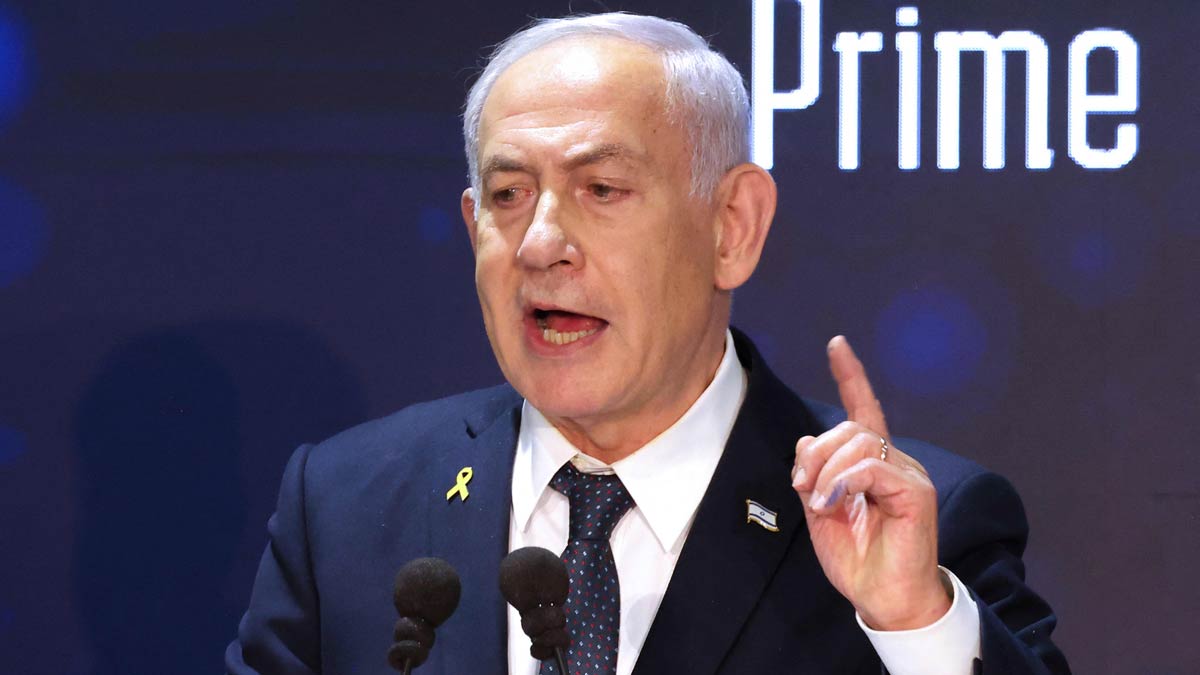How the 'QatarGate' scandal has put Israel PM Netanyahu on the backfoot
 Israel Prime Minister Benjamin Netanyahu speaks during a conference on antisemitism in Jerusalem | AFP
Israel Prime Minister Benjamin Netanyahu speaks during a conference on antisemitism in Jerusalem | AFP
Legal and political woes do not seem to end for Israeli Prime Minister Benjamin Netanyahu. On March 31, he faced a major setback as two of his top aides, Jonatan Urich and Eli Feldstein, were arrested in a scandal nicknamed ‘QatarGate’. The arrests, carried out by Israel’s elite anti-corruption unit Lahav 433 and the Shin Bet domestic intelligence agency, were part of a probe into allegations of foreign influence, national security breaches and political misconduct.
For Netanyahu, that was not the only challenge for the day. It began in a Tel Aviv courtroom, where the prime minister attended the latest hearing in his ongoing corruption trial. Since 2016, he has been accused of exchanging regulatory favours for bribes and positive media coverage—charges he denies. But his courtroom appearance was overshadowed by the police summons to him asking the PM to return immediately to Jerusalem for questioning in the ‘QatarGate’ affair. Though not a suspect, Netanyahu was summoned as a witness with insight into the case, which centres on his aides Urich and Feldstein.
The ‘QatarGate’ investigation alleges that Feldstein, while working in the prime minister’s Office, secretly took payments from an international firm linked to Qatar to push pro-Qatar stories in Israeli media. This builds on earlier accusations that he leaked classified documents about Hamas hostage negotiations. The probe raises serious concerns—bribery, breach of trust, money laundering and possible ties to a foreign agent—potentially implicating others close to Netanyahu. His Likud party, however, dismissed the arrests as a "fabricated" conspiracy by the attorney general’s Office and Shin Bet to undermine the government, even calling it a “coup d’état.”
Amid the uproar, Netanyahu escalated his feud with Shin Bet chief Ronen Bar, who had spearheaded the investigation into the aides. That same day, he named Eli Sharvit, a former navy commander, as Bar’s replacement, defying a Supreme Court ruling that had stayed Bar’s dismissal until April 8. Netanyahu claimed he had lost faith in Bar, blaming him for intelligence lapses tied to Hamas’s attack on October 7, 2023, which ignited the Gaza war. Critics, though, saw it as a retaliatory strike against the 'QatarGate' probe, accusing Netanyahu of weakening Israel’s independent institutions.
The Sharvit nomination, however, quickly unravelled. Netanyahu withdrew Sharvit’s name a day later after backlash from his conservative allies. Sharvit had recently penned a column criticising US President Donald Trump for reversing climate change policies, drawing ire from the right. There were also reports about Sharvit voicing his opposition towards Netanyahu’s judicial overhaul plans, further alienating Netanyahu’s core supporters.
The ongoing legal struggle fits into a broader clash between Netanyahu and Israel’s legal and security systems. Since his corruption trial began in 2020, his refusal to step down has polarised the nation, triggering five elections in four years. His coalition’s recent moves—like passing a law boosting political control over Supreme Court appointments and attempts to sack Attorney General Gali Baharav-Miara, who approved the police summons—have deepened the rift. Baharav-Miara has locked horns with Netanyahu over Bar’s dismissal and other decisions, pushing Israel towards a constitutional showdown.
The Likud party, meanwhile, branded Urich’s arrest “thuggish”, part of a “political hunt” to oust the prime minister and shield Bar, whose fate remains under Supreme Court review. For many, the standoff over Bar and ‘Qatar Gate’ reflects a wider battle over Israel’s democracy, with Netanyahu accused of eroding judicial and law enforcement independence.
The turmoil has spilled onto Jerusalem’s streets, as thousands protested against Netanyahu’s policies. Clashes erupted between police and demonstrators on March 31 and April 1, leading to 12 arrests. The unrest underscored the growing public frustration with a leader mired in legal battles, political scandals and a war that shows no end.
Middle East